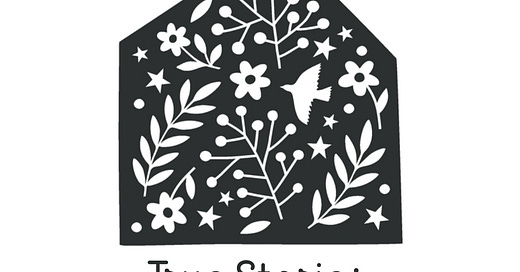Applications for free annual membership to The Clearing are currently open for those in financial need. Click here to apply • Find out more about my The Way Through Winter course • Check out my in-person retreats in March and July • Take out or renew an annual subscription this month to win a box of goodies, including a copy of Braiding Sweetgrass
Hello,
It’s time to begin our exploration of Robin Wall Kimmerer’s Braiding Sweetgrass. I, for one, am very excited. I first read this about five years ago, after hearing a lot about it. Do you ever find that the more you hear about a book from other people, the more resistant you get to actually read it? I do. I know it’s terrible to admit. But there’s an awful, cramped part of me that wants to discover things for myself; and an even more cramped part of me that hears a friend’s enthusiasm and thinks, Surely nothing can be as good at that.
Friends, I am often wrong, but rarely more so than this. Braiding Sweetgrass was published in 2013, and it is entering its second decade as an undisputed classic. Combining memoir, botany, ecology, history, folklore and anthropology, it is genre-defying and genre-defining. As a member of the Citizen Potawatomi Nation, Wall Kimmerer writes about the experience of growing up an Indigenous American and struggling to reconcile the way she saw the botanical world with the restrictive and siloed world of academic biology. Behind her is the terrible history of Native oppression, and in the present is a culture and language that has been undeniably damaged by the treatment of her people. And yet there remains something special and particular about the worldview that she has inherited, which she teases out over the course of this book.
At its heart, this is a book about reciprocity, the exchange between humans, living creatures and the animate earth. Human destruction is not inevitable, but a balance has fallen out of place, and behind that is the loss of our ability to converse with the natural world, to know it deeply and to understand it. The first section, Planting Sweetgrass, opens with the image of the Skywoman falling to earth, and being helped by the animals she finds there to stay alive. In return, she brings seeds and sunlight, providing food, shelter and medicine. Wall Kimmerer imagines that she meets Eve: ‘One woman is our ancestral gardener, a cocreator of the good green world that would be the home of her descendants. The other was an exile, just passing through an alien world on a rough road to her real home in heaven.’
The theme of reciprocity is reflected in the pecan trees and wild strawberries, ‘a world full of gifts simply scattered at your feet.’ But these stories also show how capitalist thinking limits our appreciation of these wonders, and disconnects us from our duty to care for them. Only when Wall Kimmerer - faltering - attempts to learn her own Potowatomi language does she truly begin to understand the difference in worldview. In Potowatomi, the natural world is animate, and so nouns such as ‘bay’ become verbs that imply sentience: ‘to be a bay’. ‘Of an inanimate being, such as a table, we say, “What is it?” And we answer Dopwen yewe. Table it is. But of an apple, we must say, “Who is that being?” And reply Mshimin yawe. Apple that being is.” Yawe is the animate version of to be.
If you’d like to learn a little more about Robin Wall Kimmerer - now a professor of environmental biology and the founder of the Center for Native Peoples and the Environment at SUNY - you can read this interview with her here, or listen to her wonderful interview on On Being.
So tell me: what stays with you from this first section of the book, whether you’re reading for the first time or returning for a re-read? Did it have any effect on the way you see your own relationship to the land around you? And do you have any personal experience of reconnecting with your culture?
Coming up next in our reading schedule:
17th - 23rd February: Tending Sweetgrass
24th February - 3rd March: Picking Sweetgrass
4th March - 9th March: Braiding Sweetgrass
10th March - 16th March: Burning Sweetgrass
Kaitlin Curtice, author of Native and Living Resistance, is going to join us on Tuesday 25th February for a mid-read live event - details are below the paywall.
Take care,
Katherine
Keep reading with a 7-day free trial
Subscribe to The Clearing by Katherine May to keep reading this post and get 7 days of free access to the full post archives.





